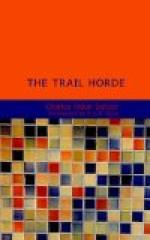She got up after a while and lighted an oil-lamp, placing it upon the table in the big room. She closed the door and then dropped listlessly into a chair beside the table, her eyes glistening, her lips quivering.
The future was somber in aspect, almost hopeless, it seemed. And yet into her mind as she sat there crept a determination—a resolution to tell her father what she knew; to tell him that she could no longer endure the disgrace of his crimes.
That meant of course that she would have to leave him, for she knew he was weak, and that he had been drawn into crime and had not the moral strength to redeem himself.
When about midnight she heard the beating of hoofs near the cabin she sat very quiet, rigid, still determined, her eyes flashing with resolution.
She was standing near the door of her room when her father entered, and as he stood for an instant blinking at the light, trying to accustom his eyes to it after riding for some time through the darkness; she watched him, noting—as she had noted many times before—the weakness of his mouth and the furtive gleam of his eyes.
He had not always been like that. Before the death of her mother she had always admired him, aware of the sturdiness of his character, of his rugged manliness, and of his devotion to her mother.
Adversity had changed him, had weakened him. And now, watching him, noting the glow in his eyes when he saw her—the pathetic worship in them—her heart protested the decision that her cold judgment had made, and she ran to him with a little, quavering, pitying cry and buried her face on his shoulder, shuddering, murmuring sobbingly:
“O Daddy; O Daddy, what have you done!”
He stood rigid, his eyes wide with astonishment, looking down at her as she clung to him as though wondering over a sudden miracle. For he knew she was not an emotional girl, and this evidence of emotion almost stunned him.
“Why, Honey!” He patted her hair and her cheeks and hugged her tightly to him. And presently he gently disengaged himself and held her at arm’s length, peering into her face.
And then, when her clear eyes met his—her gaze direct and searching even though her cheeks had paled, his eyes drooped, and his arms fell to his sides.
“I’ve done enough, Ruth,” he said, soberly.
“Why, Daddy—why did you do it? Oh, you have made it so hard for me!”
“There, there, Honey,” he consoled, reaching out and patting her shoulders again. “I’ve been a heap ornery, but it ain’t goin’ to happen again.” His eyes shone through a mist that had come into them.
“I’ve been talkin’ with Kane Lawler, an’ he opened my eyes. I’ve been blind, Ruth—blind to what it all meant to you. An’ from now on I’m goin’ straight—straight as a die!”
“Ruth,” he went on, when he saw incredulity in her gaze; “I wasn’t to tell you. I reckon Lawler would half kill me if he know’d I was tellin’ you. But there ain’t no use, I’ve got——”




